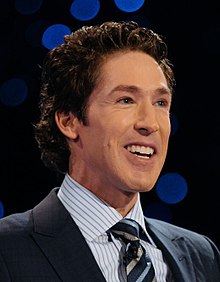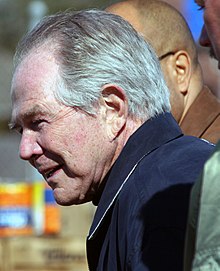Televangelism

Televangelism (a
Televangelists are either official or self-proclaimed
Televangelism began as a uniquely American phenomenon, resulting from a
Some countries have a more regulated media with either general restrictions on access or specific rules regarding religious broadcasting. In such countries, religious programming is typically produced by TV companies (sometimes as a regulatory or public service requirement) rather than private
Terminology
The word televangelism is a
History
Radio

Christianity has always emphasized
One of the first ministers to use radio extensively was
In the
In the 1930s, a famous radio evangelist of the period was
An association of American
Television


Although television also began in the 1930s, it was not used for religious purposes until the early 1950s. Jack Wyrtzen and Percy Crawford switched to TV broadcasting in the Spring of 1949. Another television preacher of note was Fulton J. Sheen, who successfully switched to television in 1951 after two decades of popular radio broadcasts and whom Time called "the first 'televangelist'".[13] Sheen would win numerous Emmy Awards for his program that ran from the early 1950s, until the late 1960s.
In 1951, producer Dick Ross and

After years of radio broadcasting in 1952
The 1960s and early 1970s, saw television replace radio as the primary home entertainment medium, but also corresponded with a further rise in
Controversies and criticism
Televangelists frequently draw criticism from other Christian ministers. For example, preacher
Someone needs to say this plainly: The faith healers and health-and-wealth preachers who dominate religious television are shameless frauds. Their message is not the true Gospel of Jesus Christ. There is nothing spiritual or miraculous about their on-stage chicanery. It is all a devious ruse designed to take advantage of desperate people. They are not Godly ministers but greedy impostors who corrupt the Word of God for money's sake. They are not real pastors who shepherd the flock of God but hirelings whose only design is to fleece the sheep. Their love of money is glaringly obvious in what they say as well as how they live. They claim to possess great spiritual power, but in reality they are rank materialists and enemies of everything holy.
—John MacArthur[22]
Similarly, Ole Anthony wrote very critically of televangelists in 1994.[23]
A proportion of their methods and theology are held by some to be conflicting with Christian doctrine taught in long existing traditionalist congregations. Many televangelists are featured by "discernment ministries" run by other Christians that are concerned about what they perceive as departures from sound Christian doctrine.
- Many televangelists exist outside the structures of Christian denominations, meaning that they are not accountable to anyone.
- The financial practices of many televangelists are unclear. A 2003 survey by the St. Louis Post-Dispatch indicated that only one out of the 17 televangelists researched were members of the Evangelical Council for Financial Accountability.[24]
- The prosperity gospel taught by many televangelists promises material, financial, physical, and spiritual success to believers, which can run counter to several aspects of Christian teaching that warn of suffering for following Christ and recommend surrendering one's material possessions (see: Jesus and the rich young man).
- Some televangelists have significant personal wealth and own large properties, luxury cars, and various transportation vehicles such as private aircraft or ministry aircraft. This is seen by critics to be contradictory to traditional Christian thinking.[25]
- Televangelism requires substantial amounts of money to produce programs and purchase airtime on cable and satellite networks. Televangelists devote time to fundraising activities. Products such as books, CDs, DVDs, and trinkets are promoted to viewers.
- Televangelists claim to be reaching millions of people worldwide with the gospel and producing numerous converts to Christianity. However, such claims are difficult to verify independently and are often disputed.[26]
- Several televangelists have been very active in the national or international political arena (e.g., conservative politics on their programs. Such televangelists may occasionally arouse controversy by making remarks deemed offensive on their programs or elsewhere, or by endorsing partisan political candidates on donor-paid airtime, which runs afoul of the Johnson Amendment's ban on tax-exempt organizationssupporting or opposing candidates for political office.
Senate probe
In 2007,
- Kenneth and Gloria Copeland of Kenneth Copeland Ministries of Newark, Texas;
- Creflo Dollar and Taffi Dollar of World Changers Church International and Creflo Dollar Ministries of College Park, Georgia;
- Benny Hinn of World Healing Center Church Inc. and Benny Hinn Ministries of Grapevine, Texas;
- Eddie L. Long of New Birth Missionary Baptist Church and Bishop Eddie Long Ministries of Lithonia, Georgia; "DocuSeries – Sex Scandals and Religion" did a 2011 investigative episode on his alleged sexual misconduct[28]
- Joyce Meyer and David Meyer of Joyce Meyer Ministries of Fenton, Missouri and
- Randy White and ex-wife Paula White of the Without Walls International Church and Paula White Ministries of Tampa.[29]
On January 6, 2011 Grassley released his review of the six ministries response to his inquiry. He called for a further congressional review of tax-exemption laws for religious groups.[30]
In Islam

In
Examples of well-known Islamic televangelist TV channels include
See also
- List of television evangelists
- List of televangelists in Brazil
- McDonaldisation, Masala McGospel and Om Economics, study of televangelism in India
- National Religious Broadcasters
- Our Lady of Perpetual Exemption
- Parodies of televangelism
- Prosperity theology
- Televangelist Peter Popoff exposed by James Randi
References
- ^ Denis J. Bekkering, "From 'Televangelist' to 'Intervangelist': The Emergence of the Streaming Video Preacher." The Journal of Religion and Popular Culture 23, no.2 (2011), 101–117.
- ISBN 978-0201038859.
- ^ "Bishop Fulton Sheen: The First 'Televangelist'", Time Magazine, Monday, April 14, 1952
- ^ "S. Parkes Cadman dies in coma at 71" (PDF). The New York Times. July 12, 1936. Retrieved 2009-01-26.
- ^ "Radio Religion". Time magazine. January 21, 1946. Archived from the original on January 25, 2008. Retrieved 2007-12-16.
- ^ Jaker, Bill; Sulek, Frank and Kanze, Peterr. The airwaves of New York: illustrated histories of 156 AM stations in the Metropolitan Area, 1921-1996 Page 168. WQAO went on the air 1923. WQAO went on the air 1923. One of the earliest religious broadcasters in New York. Retrieved November 20, 2009.
- ^ "Welcome to WMCA 570 AM & 102.3 FM - New York | The Mission WMCA - New York, NY". 2020-05-29. Archived from the original on 2020-05-29. Retrieved 2020-05-29.
- ^ "Air Worship". Time magazine. February 9, 1931. Archived from the original on December 15, 2008. Retrieved 2007-12-19.
- ^ "Billy Graham Center archives". Wheaton College. Retrieved 2007-08-30.
- ^ Thomas H. O'Connor (1985). Baltimore Broadcasting from A to Z. Baltimore, Maryland: O'Connor Communications.
- ^ "Radio Religion". Time Magazine. January 21, 1946. Archived from the original on January 25, 2008. Retrieved 2007-12-16.
- ^ J. Gordon Melton, Phillip Charles Lucas, Jon R. Stone, Prime-time Religion: An Encyclopedia of Religious Broadcasting, Oryx Press, USA, 1997, p. 383
- ^ "Bishop Fulton Sheen". Time. 1952-04-14. Archived from the original on August 25, 2013. Retrieved 2011-01-21.
- ^ John Lyden, The Routledge Companion to Religion and Film, Taylor & Francis, Abingdon-on-Thames, 2009, p. 82
- ^ David E. Harrell Jr. "Healers and Televengelists After World War II in Vinson Synan," The Century of the Holy Spirit: 100 Years of Pentecostal and Charismatic Renewal (Nashville: Nelson, 2001) 331
- ^ ICMtv produce la Misa de Canal 4 - Iglesia Católica Montevideo, 21 September 2017
- ^ Randall Herbert Balmer, Encyclopedia of Evangelicalism: Revised and expanded edition, Baylor University Press, USA, 2004, p. 157
- ^ George Thomas Kurian, Mark A. Lamport, Encyclopedia of Christianity in the United States, Volume 5, Rowman & Littlefield, USA, 2016, p. 469
- ^ George Thomas Kurian, Mark A. Lamport, Encyclopedia of Christianity in the United States, Volume 5, Rowman & Littlefield, USA, 2016, p. 2275-2276
- ^ P. Thomas, P. Lee, Global and Local Televangelism, Springer, USA, 2012, p. 182
- ^ Elaine Woo (December 2, 2013). "Paul Crouch dies at 79; founder of the Trinity Broadcasting Network". The Washington Post. Retrieved July 6, 2014.
He bought more television stations, then piled on cable channels and eventually satellites until he had built the world's largest Christian television system...
- ^ "A Colossal Fraud". Grace to You.
- ^ Corruption in Televangelism and Paganism in the American Church. September 23, 1994. Archived August 12, 2013, at the Wayback Machine
- ^ "Archived copy". Archived from the original on 2010-05-23. Retrieved 2010-05-25.
{{cite web}}: CS1 maint: archived copy as title (link) - ^ See, for example, "Lee Zurik Investigation: Could ministries face IRS issues? - New Orleans News, Breaking News, Sports & Weather - FOX 8 Live WVUE-TV Channel 8". Archived from the original on 2010-05-30. Retrieved 2010-05-25.
- ^ Calvin L Smith wrote at http://www.calvinlsmith.com/2010/05/televangelism.html, "Thus, despite a clear market demand for religious broadcasting... the evidence is that, ironically, the medium actually wins very few converts and is completely ineffective as an evangelistic tool. Instead religious broadcasting is primarily aimed at and viewed by Christians..."
- ^ "Grassley seeks information from six media-based ministries" (Press release). 6 November 2007. Archived from the original on 5 July 2018. Retrieved 4 July 2018.
- ^ "Sex Scandals In Religion – Ep. 4: IN THE NAME OF THE LORD". Earthbook.tv. Archived from the original on 29 May 2011. Retrieved 20 October 2011.
- ^ "Sen. Grassley probes televangelists' finances". USA Today. The Associated Press. 7 November 2007. Retrieved 20 October 2011.
- ^ "The United States Senate Committee on Finance: Newsroom – Ranking Member's News". Finance.senate.gov. 6 January 2011. Archived from the original on 8 January 2011. Retrieved 20 October 2011.
- ^ ISSN 0013-0613. Retrieved 2019-08-26.
- ^ "May 16, 2008 ~ Muslim Televangelists | May 16, 2008 | Religion & Ethics NewsWeekly | PBS". Religion & Ethics NewsWeekly. 2008-05-16. Retrieved 2019-08-26.
- ^ "Malaysia ministers want Muslim preacher Zakir Naik expelled". www.aljazeera.com. Retrieved 2019-08-26.
- ISSN 0261-3077. Retrieved 2019-08-26.
- from the original on 2022-01-12. Retrieved 2019-08-26.
- ^ "Peace TV faces UK ban after presenter calls gay people "worse than animals"". Gay Times. 2019-07-28. Retrieved 2019-08-26.
- ^ "Zakir Naik, Wanted In India, Banned From Making Speeches In Malaysia". NDTV.com. Retrieved 25 August 2020.
- ^ The Times of India (10 July 2016). "Bangladesh bans televangelist Zakir Naik's Peace TV". The Times of India. Archived from the original on 10 July 2016. Retrieved 10 July 2016.
- ^ "Peace TV stations fined £300,000 for hate speeches as it pulls out of the UK". The National News. 14 May 2020. Retrieved 28 April 2021.
Further reading
- Bekkering, Denis (2018). American Televangelism and Participatory Cultures: Fans, Brands, and Play With Religious "Fakes". Palgrave Macmillan.
